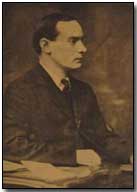
Perhaps on Nov. 10, 1879, at 27 Great Brunswick St., Dublin, as the mother and father gazed down at their newborn son, they had a vision of what his future held. That may explain why they named him Patrick Henry Pearse. Their son would grow to be the very embodiment of the words of the American patriot Patrick Henry, whose name he bore, who uttered in the Virginia Convention on March 23, 1775: "I know not what course others might take, but as for me, give me liberty or give me death!" Indeed, these words would have formed a very proper epitaph on the gravestone of Pearse, the leader of the Easter Rising 1916
Like many other uncompromising Irish rebels, Pearse was not of pure Irish blood; he was the product of a mixed English-Irish marriage. His father was a monumental sculptor and an Englishman, his mother was a native of County Meath. Pearse began his life-long study of the Irish language at age 11; perhaps his strident nationalism was a byproduct of his study of the language that the British had tried so hard to destroy over the centuries.
After graduation from Royal University of Ireland he was called to the Bar, but he never practiced. He joined the Gaelic League in 1895. In 1908, along with friends Thomas MacDonagh, Con Colbert, and his brother William, Pearse founded an Irish language school called St. Enda's at Cullenwood House in Rathmines, outside Dublin. Their school prospered, and in 1910 they moved it to The Hermitage, Rathfarnham, where Robert Emmet had courted Sarah Curran. The school operated until 1935, run eventually by Pearse's mother and sister, but none of the four founders of the school would see that day all four would be executed within five days of each other in May 1916.
In February 1914, Pearse traveled to the United States seeking money from the Irish-American community for his school and for the Irish Volunteers. He made contact with Joseph McGarrity and former Fenian John Devoy, who helped him on both counts. In July 1914, in the famous Howth gun-running incident, the Irish Volunteers obtained weapons and ammunition. The organization now had the weapons and financial support it needed to consider the military action that many of them, including Pearse, believed necessary to end British rule in Ireland. "There are many things more horrible than bloodshed," Pearse had once written, "and slavery is one of them." In the militants' view, the circumstances were now rife for action, with the republicans possessing organization and weapons. Pearse felt ready to strike for his dream.
In the summer of 1915 the body of Fenian Jeremiah O'Donovan Rossa was brought home from New York for burial. At Dublin's Glasnevin Cemetery, Pearse delivered one of the most famous graveside orations in the long history of the Irish revolutionary movement. His speech stirred the Irish nation.
"But I hold it a Christian thing, as O'Donovan Rossa held it, to hate evil, to hate oppression, and hating them, to strive to overthrow them," said Pearse. "... Life springs from death; and from the graves of patriot men and women spring living nations." Pearse's clarion call to armed revolt reverberated through the length and breadth of Ireland. On April 24, 1916, words became action.
*Part 2 continued on the Wild Geese site


